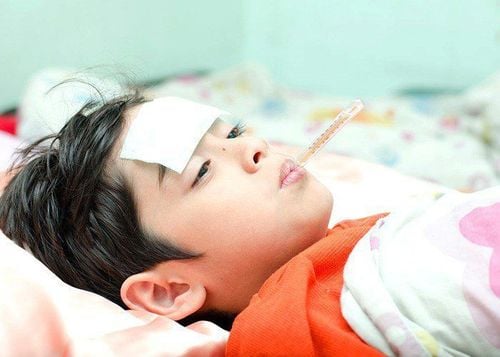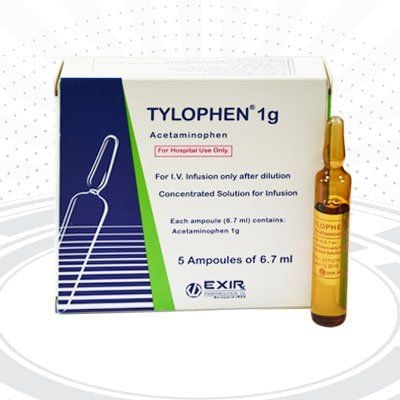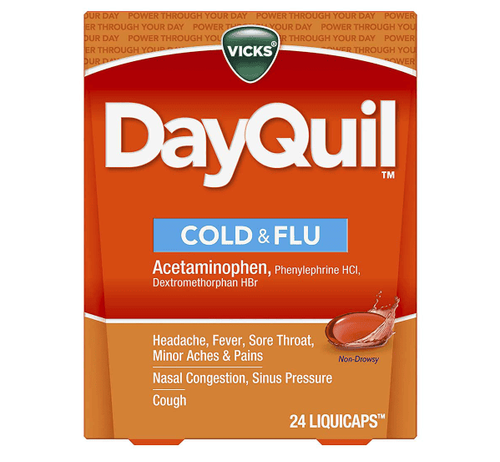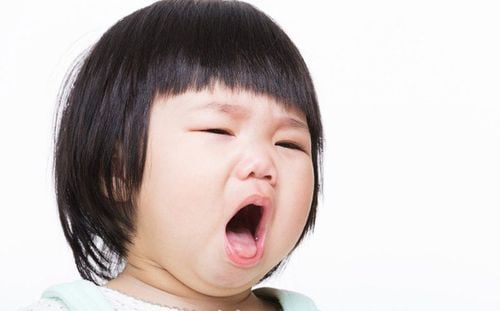This is an automatically translated article.
The article was professionally consulted by Specialist Doctor II Le Thanh Cam - Department of Pediatrics - Neonatology, Vinmec Da Nang International General Hospital. Dr. Cam has 15 years of experience working in the field of Pediatrics, having worked in the Department of Pediatrics - Da Nang Hospital and Danang Center for Obstetrics and Gynecology. His strength is in the diagnosis and treatment of pediatric pathologies, resuscitation, pediatric emergency.Pharyngitis is a fairly common disease in children. If not detected and treated promptly, the disease can cause many complications such as respiratory tract infection, otitis media, purulent lymphadenitis or acute glomerulonephritis, etc. Therefore, parents need to be alert and careful. Should quickly take the baby to the hospital if the child has a sore throat and fever that does not go away for a few days, accompanied by warning symptoms of severe disease.
1. Why do children get sore throats?
Acute pharyngitis is the rapid swelling of the throat mucosa. There are many causes of sore throat in children, namely:
Due to living environment: sudden weather changes, wet rain; Car smoke, secondhand smoke, and dust in the air are the leading causes of nasopharyngitis in children. In addition, children who have just been weaned, changed their weaning diet or have just attended kindergarten, so they have not been able to get used to agents from a foreign environment, are also susceptible to nasopharyngitis. Caused by viruses (influenza, measles, Adenovirus,...), bacteria (pneumococcal, staphylococcus, streptococcus,...) and fungi (Candida).
Trắc nghiệm: Nhận biết sớm dấu hiệu chậm phát triển thể chất và trí tuệ ở trẻ
Nếu 6 tuổi không biết đếm số, 7 tuổi vẫn chưa phân biệt được giữa thực tế và tưởng tượng thì có thể bé chậm phát triển thể chất và trí tuệ hơn so với bạn bè cùng lứa. Bạn đã nhận biết được các dấu hiệu bất thường sớm này chưa? Cùng làm nhanh bài trắc nghiệm sau để trang bị thêm kiến thức cho mình nhé!
The following content is prepared under supervision of Thạc sĩ, Bác sĩ y khoa, Ma Văn Thấm , Nhi , Phòng khám Đa khoa Quốc tế Vinmec Dương Đông(Phú Quốc)
2. How many days should the child be taken to the hospital with a sore throat and fever?
When having acute nasopharyngitis, children often have symptoms such as: Low fever or high fever, which can be up to 39 - 40 degrees Celsius; runny nose, stuffy nose, cough, sneezing, sore throat, headache. Initially, the child had a dry cough, then the cough had sputum; the child is fussy, anorexic, has trouble sleeping, is tired and often breathes through his mouth due to a stuffy nose; Vomiting, loose stools.
When a child has a sore throat with a fever that doesn't go away for a few days with one of the following symptoms, parents should quickly take the child to the doctor:
Continuous high fever, ineffective medicine and warm compresses, possibly convulsions . Children cough a lot, have difficulty breathing, shortness of breath. The child may breathe faster than normal, sometimes with chest tightness.
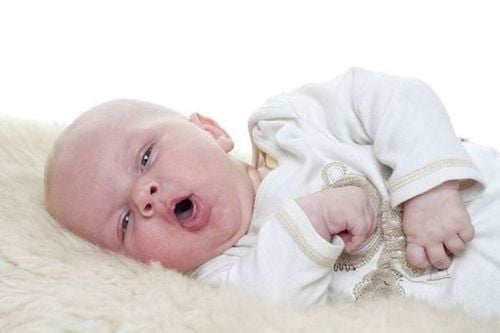
Ear discharge. Children vomit a lot, have loose stools many times a day. The disease does not get better after 2 days of treatment. If a child has a sore throat and fever for a few days, if not treated, the disease can last for 7-10 days and can easily lead to complications such as tonsillitis, otitis media, sinusitis, bronchitis, and laryngitis. , purulent lymphadenitis, arthritis (progressive rheumatic fever), acute glomerulonephritis (if the cause is group A streptococcus bacteria - S.pyogenes) and the most dangerous is bacteremia.
3. How to take care of a child with a sore throat and fever
3.1. Nasopharyngeal hygiene
If the child has a slight stuffy nose, and the nasal secretions are still loose, the parents can wipe the baby's nose with a soft cloth. In the case of thick nasal secretions, with runny nose, parents should put 2-3 drops of physiological saline in each nostril, wait for a while for the salt water to infuse to soften the runny nose, then gently rub the baby's nose with their hands to soft and flaking nasal discharge. If the baby's nasal discharge is too much and thick, parents can use a nasal aspirator to suck on the child. However, parents should not abuse the nasal suction method because this method can cause damage to the nasal mucosa. In particular, adults absolutely do not use their mouths to directly suck on children's nose and drool. Use a soft tissue to wipe your baby's nose and drool, then discard immediately after use. Parents should not use a bucket towel because after each time wiping the nose or drooling a child, if they do not change a new towel but still use the old one, bacteria/viruses will still remain on the towel and continue to cause illness in the child. A vasoconstrictor can be used as directed by the doctor if the child has a sore throat and a fever that does not go away for a few days. Note: When the child has nasopharyngitis, parents can use physiological saline to wash the baby's nose and throat, but need to strictly follow the doctor's instructions.
3.2. Adjust your diet
Should give your baby foods rich in nutrients, soft, easy to swallow and easy to digest. Give your baby plenty of water, preferably a solution of oresol and fruit juice. Feed your child on demand, divided into several meals a day, and eat less food at each meal than usual. Parents should not force their children to eat all the prepared food because often when they are sick, they will have no appetite. Can use steamed kumquats with honey, ginger, lemon, ... for children to drink to treat cough.
3.3. Take fever-reducing medications and antibiotics as prescribed by your doctor
Parents pay attention not to arbitrarily use antibiotics and do not reuse the old prescription of the previous visit. At the same time, parents should not arbitrarily use prolonged vasoconstrictor drugs for children with sore throat and fever without a doctor's prescription.

When a child has a sore throat with a fever that doesn't go away for a few days, parents should take the child to an ear, nose and throat specialist to quickly identify the disease and actively treat it. This will help treat the disease effectively, prevent the risk of unpredictable complications.
As a key area of Vinmec Medical system, Pediatrics Department always brings satisfaction to customers and is highly appreciated by industry experts with:
Gathering a team of leading doctors and nurses in Pediatrics : Consists of leading experts with high professional qualifications (professors, associate professors, doctorates, masters), rich experience, worked at major hospitals such as Bach Mai, 108,... The doctors are well-trained, professional, have a mind - range, and are knowledgeable about young psychology. In addition to domestic pediatric specialists, the Department of Pediatrics also has the participation of foreign experts (Japan, Singapore, Australia, USA) who are always pioneers in applying the latest and most effective treatment regimens. . Comprehensive services: In the field of Pediatrics, Vinmec provides a series of continuous medical examination and treatment services from Newborn to Pediatric and Vaccine,... according to international standards to help parents take care of their baby's health from birth to childhood. from birth to adulthood Specialized techniques: Vinmec has successfully deployed many specialized techniques to make the treatment of difficult diseases in Pediatrics more effective: neurosurgery - skull surgery, stem cell transplantation. blood in cancer treatment. Professional care: In addition to understanding children's psychology, Vinmec also pays special attention to the children's play space, helping them to have fun and get used to the hospital's environment, cooperate in treatment, improve the efficiency of medical treatment.
Please dial HOTLINE for more information or register for an appointment HERE. Download MyVinmec app to make appointments faster and to manage your bookings easily.







